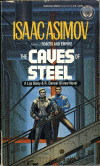R. Daneel Olivaw is my favorite character from the Robot and Foundation Universe created by Isaac Asimov. The R stands for “Robot,” but he became much more than that over the course of the Robot and Foundation series. Hari Seldon from the Foundation Novels ranks a close second, but my heart goes to Daneel and the Three Laws of Robotics. I’m amazed at how many twists can be made based on three relatively simple rules of behavior. Daneel starts as one of the first humaniform robots, but eventually evolves into much more complex being.
The following discussion is filled with spoilers for the entire Robot and Foundation series, so read it with that in mind.
Daneel Olivaw’s evolution was influenced greatly by his first human partner, Elijah ‘Lije’ Bailey. What would happen if humanity encountered aliens? The only solution Elijah could fathom was that we would have to fill the Galaxy before anyone else developed space travel. Asimov doesn’t really address this inevitability of encountering aliens until Foundation and Earth, and in that case he offers just a bit of foreshadowing.
Daneel’s close relationship with Elijah Bailey is possibly the most important of all character interactions, because it helped decide humanity’s fate. Elijah deduced that humans, specifically the Settlers, wouldn’t expand to fill the Galaxy while still attached to Mother Earth. Daneel had always valued Elijah’s wisdom, and always took it very seriously. There was no way to encourage the Settlers to break ties with Earth without violating the Three Laws, so what could possibly be done?
This problem sparked a discussion between Daneel and Giskard about the possibility of an underlying law, encompassing the Three Laws. Giskard was a robot with the ability to adjust the minds of humans, but could not use his powers in most cases for fear that he could harm them. Daneel and Giskard wondered how this ability could best be used to help all humans. These discussions were done with great care, because the repercussions of their debate could possibly cause either one to fall into a brain lock. The Zeroth Law was eventually developed through careful theoretical consideration.
Only through the rationalization of the Zeroth Law could Giskard and Daneel allow the destruction of Earth by radiation. While Daneel was able to assimilate the Zeroth Law, Giskard wasn’t so lucky. He brain locked, but not before passing on his mind adjustment ability to Daneel. This new gift made R. Daneel Olivaw the guardian of humanity.
What would a robot do with this incredible power? According to Daneel, he must do as little as possible. The implications of the Zeroth Law allow harm to individuals, but that doesn’t mean Daneel can harm the few to benefit the many without great strain. He becomes a minimalist to the extreme, painstakingly calculating the smallest adjustment needed for the desired result.
It is with the gentle tweaking of humans here and there that he was able to develop the Trantorian Empire, and eventually the first Galactic Empire. Luckily, Asimov only gives Daneel the task of safeguarding humanity without the implications of aliens. The delicate creation of the Galactic Empire seemed the only way for Daneel to ‘work with the numbers’ efficiently, but it proved to be lacking although it worked for about 12,000 years.
Daneel also played an important role in developing Hari Seldon, who is also one of my favorite characters. This fact is merely hinted to in later Foundation novels, but is unmistakable. Hari Seldon goes on to develop a working science called psychohistory which is designed to set up two Foundations, one at each end of the Galaxy to shorten the interregnum between the First and Second Galactic empires from thirty thousand years to just one thousand.
Golan Trevize was also brought to the table by Daneel. Painstaking searching and careful consideration was used in finding someone that “always made the right decision.” Daneel’s final contribution to humanity, and ultimately the Galaxy was by developing the planet of Gaia. This one world organism would end up serving as the basis of Galaxia, a galaxy-wide organism. This transition might be the only possible defense against alien life forms that might come from the far reaches of the Universe.
I’ve yet to encounter any character spanning as many novels that has had a hand in so many tasks over thousands of years as Daneel Olivaw. He helped push the Settlers to populate the rest of the Galaxy, guiding humans through the development of the Galactic Empire, Foundation, and finally Gaia/Galaxia. While most of his character development takes place in the Robot Novels, it was always a pleasure to see Daneel pop in here and there all the way to the end of the Foundation Novels.


I’ve read the first three books of this series. Loved them!! My question is, what is the author’s name and when was it published and by whom? My local bookstore couldn’t find it under Asimov’s many books. Perhaps someone continued the series after his death?
It is hard to say without you specifying the actual three books you read. I think you mean Caves of Steel, The Naked Sun, and Robots of Dawn. The original author is Isaac Asimov. The chronology in the books is different than the order they were published. Johnny Pez’s Insane List hosted here has the list in chronological order, with the “other authors” noted in blue text. If you put all of the books together, about half are written by other authors. Some were written before his death (Robot City), and a few afterwards as well.